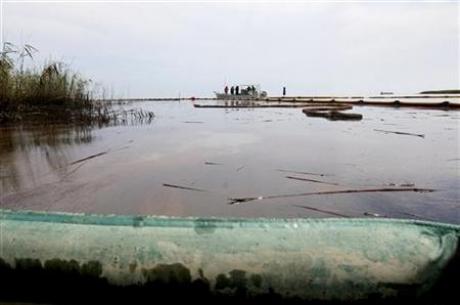BP Oil Spill Shows Need For Biofuels, Developers Say
Country: US
Author: Carey Gillam

Oil floats on the surface in Pass A Loutre near Venice, Louisiana
May 26, 2010. Louisiana Governor Bobby Jindal gave a tour of the
area to reporters showing the damage of the oil spill.
Photo: Sean Gardner
The disastrous oil spill in the Gulf of Mexico illustrates a pressing need for the United States to pass legislative incentives to drive investment dollars into cellulosic and algae-based biofuel facilities, biofuel industry leaders said on Thursday.
"This is just a wakeup call for our dependence on petroleum," said Harrison Dillon, President of Solazyme Inc, which is building an integrated biorefinery in rural Pennsylvania aiming for commercial-scale production of algae-based fuel.
Harrison said the BP spill, the largest in U.S. history, highlights the "ugly side of our dependence on fossil fuels."
"It just points even more strongly for the need for all these technologies to be developed and encouraged. The oil that we make through our process is biodegradable oil. It is made on land. You don't have those kinds of risks," Dillon said.
A range of commercial-scale projects to develop cellulosic and algae biofuels are ready to be built, but the economic downturn, uncertainty in global financial markets and the lack of long-term U.S. government support is making it hard to raise capital, company officials said in a conference call.
A massive jobs bill pending in Congress includes a $1-per-gallon tax credit for biodiesel retroactive to January 1 and valid through the end of 2010. The bill also includes a 50-cent credit for fuel produced from biomass.
More than 30 biofuel companies and trade associations have asked leaders of the House Ways and Means Committee to extend the cellulosic biofuel production tax credit to at least 2016, and to make algae biofuel producers eligible, creating a renewable investment tax credit option.
Wes Bolsen, chief marketing officer for Illinois-based Coskata Inc, said the recent move by French oil company Total to take an equity stake in Coskata is part of a growing commitment by oil companies to play a bigger role in advancing biofuels.
Still, government policy support is critical to move forward to commercial production, he said.
"What we have is a technology that is ready today. We believe we can economically compete head to head with gasoline. We need the policy that is going to show we have the enduring commitment," he said.
Coskata, founded four years ago, has a demonstration facility in Pennsylvania that can produce cellulosic ethanol from grass, trash, wood chips, and various crop residues.
HR BioPetroleum Chief Operating Officer Martin Sabarsky said his company needs more government support if it is to proceed with a commercial algae-based biofuels facility in Hawaii. It has received support from Royal Dutch Shell oil company but is having problems securing needed private capital.
Sabarsky recent discussions with Shell in light of the BP oil spill tragedy have further underscored the need for alternative fuels.
"They (Shell) have recognized... that the age of easy oil is over," he said.
(Editing by Lisa Shumaker)
© Thomson Reuters 2010 All rights reserved
